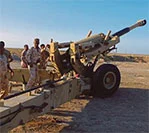STAGGERING: We also need to calculate the long-term socio-historical cost to the Arab people and Arab civilisation
WARS do not simply kill people, they destroy cultures and wreck civilisations, too. Here in Southeast Asia we are familiar with the sad legacy of the dreaded Khmer Rouge, who, in their blind obsession with purity and returning to some “pure state” in the past, moved the populations of cities to the countryside and in the process decapitated the intellectual elite of Cambodia: killing scholars, professionals, business people and merchants, the intellectual cream of Cambodian society. In the process they also laid waste to universities and libraries, destroyed civil architecture and erased all traces of the colonial past.
But in the wake of their demise, Cambodia suffered the trauma of loss and destruction, and continues to suffer today. This is what happens when universities are targeted and books destroyed, when hospitals are shut and markets are closed: The most fundamental accoutrements of normal civilian life are lost, and it will take more than a generation for society to regain its sense of identity and purpose.
It is for the same reason that we ought to lament the on-going state of crisis in countries like Iraq and Syria, that are in the grip of violent conflict and where radical militants are attempting to overthrow not only states but also destroy the cultural and civilisational patrimony of those societies. In particular, we are worried by the reports of the destruction of civic space and civic architecture, with news of libraries being burned, schools and universities being attacked or forced to shut down.
Compounding matters is the fact that this destruction has been brought about by both sides: the radical militants who have hijacked the good name of Islam to do things that are wholly un-Islamic such as killing prisoners and civilians; as well as the international response that has come in the form of bombing campaigns. The combined effect of these factors means that for millions of people in Iraq, life is no longer normal and a return to normality seems further than ever before.
The Muslim world in particular stands aghast at how the militants can hijack the name of Islam to conduct these attacks that are in fact destroying the cultural legacy of Islam itself, and it is for that reason that I and many other scholars have refused to call them the so-called “Islamic State (IS)” movement in the first place. But the deeper question is this: do these militants — including foreign volunteers from Europe and Asia, actually realise the gravity of their actions and the long-term consequences of their deeds?
And does the international community seriously think that adding more bombs and air attacks to the equation would bring about normality any time soon?
Let us be clear about this: Iraq, like Afghanistan and the other countries affected by this radical threat, is a country that has not known peace for two decades now.
From the First Gulf War to the present, the people of Iraq have been bombed, invaded and made to suffer from both insurgencies and counter-insurgency campaigns.
While the loss of human life itself has been staggering, we also need to calculate the long-term socio-historical cost to the Arab people and Arab civilisation as well.
After the invasion of Iraq, there was news of the destruction and looting of the Baghdad museum, where desperate civilians and insurgents alike plundered the wealth of the nation for the sake of trying to sell artifacts to save themselves.
Libraries have been burned, books and holy texts of immeasurable historical and artistic worth have been burned, lost and stolen. What took centuries to build has been lost in the space of a few years, and now the situation has been pushed to the brink of a historical disaster, thanks to the violence of the militants who have targeted lawyers, activists, scholars and public servants.
Baghdad, once the jewel of Arab-Muslim civilisation, has been brought to a state of near-destitution. Even if peace can ever be restored to the countries affected, can we seriously expect the glory of Arab civilisation to be restored as well?
How? On what grounds? How can the great civilisational achievements of the Arab world ever be showcased again for the benefit of the world and the next generation, if libraries, museums and universities have been plundered and burned in the process — for it was in the scientific, artistic and philosophical domains that Arabic civilisation truly flowered.
We need to see that these militants, who have been directly responsible for the violence in Iraq and Syria, are no different from the Khmer Rouge of the past, with their brand of anti-intellectualism that is profoundly opposed to the universal spirit of Arab science and philosophy, and that they are also responsible for the downfall of Arab civilisation today.
For us in Southeast Asia, facing the daunting prospect of convincing ordinary Muslims that violent militancy is not the solution to the problem, we also need to say this: By going to places like Iraq and Syria to take part in the violence and destruction there, you are in fact aiding and abetting the perpetuation of chaos and disorder in the Arab world, thereby weakening the power of Arab states further.
Even if such militancy succeeds, it would be at the cost of the destruction of Arab society, its civic institutions and its grand historical and cultural patrimony.
So, whose interests are really being served here, and are these militants not themselves the tools that have been used to destroy Arab civilisation?
Article by Dr Farish Noor which appeared in New Straits Times,
3 November 2014.





